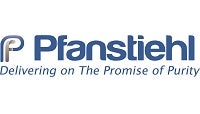Pfanstiehl Launches High-Purity Glycine Injectable-Grade Excipient for Biologics, Vaccines and Downstream Protein Purification
Pfanstiehl, a global leader in high-purity excipient manufacturing, announces the release of its high-purity, low-endotoxin, low-metal multi-compendial glycine, an excipient-grade amino acid specifically engineered for injectable biologics, vaccines, and the downstream purification of monoclonal antibodies (mAbs).
Manufactured under ICH-Q7 cGMP regulations at Pfanstiehl’s advanced facility in Waukegan, Illinois, this injectable-grade glycine meets the rigorous requirements for pharmaceutical and biopharmaceutical applications. It is multi-compendial and complies with global pharmacopoeial standards, delivering unparalleled quality and performance for therapeutic formulations.
Why glycine matters in biologics and protein purification
Glycine is a critical excipient in pharmaceutical formulations and plays a vital role in downstream processing of monoclonal antibodies. Glycine enhances the stability, solubility and overall efficacy of biologic medications and drugs, making it a critical component in their final formulations.
In purification workflows, glycine is frequently used as a buffering agent in protein A chromatography elution buffers, enabling precise control of pH and ensuring optimal protein recovery while maintaining the integrity of sensitive biologics.
Why glycine is used as an excipient in final formulations for biologics
Glycine is commonly used as an excipient in the final formulations of biologic drugs due to its beneficial properties in stabilising the product. Here are the key reasons why glycine is used:
- Stabilisation of the protein structure
- Glycine helps stabilise mAbs by acting as a buffer or a stabiliser in the formulation. It can reduce aggregation, denaturation and degradation of the antibody, which are common challenges during storage and transport.
- It contributes to maintaining the tertiary and quaternary structures of the protein, ensuring that the mAb retains its functionality.
- pH buffering capacity
- Glycine has buffering properties that help maintain the pH of the formulation within an optimal range for mAb stability. This is particularly important because pH shifts can lead to protein aggregation or degradation.
- Osmotic balance
- Glycine contributes to the isotonicity of the formulation, making it safer and more comfortable for intravenous administration. Maintaining isotonicity is essential for patient comfort and reducing adverse reactions during drug delivery.
- Reduction of surface adsorption
- mAbs can adsorb to surfaces of vials, syringes or other storage containers, which can lead to loss of the active drug. Glycine reduces this surface adsorption by acting as a bulking agent or stabiliser.
- Cryoprotectant and lyoprotectant
- In freeze-dried (lyophilised) formulations, glycine can act as a cryoprotectant or lyoprotectant. It protects the antibody during the freezing and drying processes, preserving its structural integrity and activity.
- Compatibility with other excipients
- Glycine is chemically inert and does not interact negatively with other excipients or the active mAb, making it a versatile choice in formulations.
Key features of Pfanstiehl’s HPLE-LM™ glycine
- High purity: Optimised for use in the most sensitive pharmaceutical and biopharmaceutical applications.
- Low endotoxin levels: Meets stringent injectable-grade standards for enhanced patient safety.
- Low metals content: Ideal for use in biologic formulations and purification processes where impurity levels must be tightly controlled.
- Multi-compendial compliance: Aligned with global pharmacopoeial standards, including USP, EP and JP.
- cGMP manufacturing: Produced in compliance with ICH-Q7 regulations, ensuring unmatched quality, consistency and traceability.
- Injectable-grade quality: Specifically tailored for use in biologics, vaccines and downstream purification workflows.
Supporting critical therapeutics
This latest innovation aligns with Pfanstiehl’s mission to advance therapeutic development by offering premium excipients designed to enhance product safety, efficacy and manufacturability. By enabling precise elution conditions in purification and contributing to the stability of biologics and vaccines, Pfanstiehl’s HPLE-LM™ glycine is set to become an essential component in pharmaceutical manufacturing worldwide.
Pfanstiehl’s high-purity, low-endotoxin, low-metal glycine cGMP is available now for biopharmaceutical and research applications.

